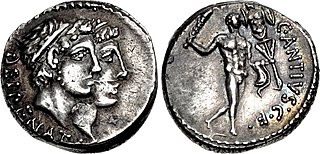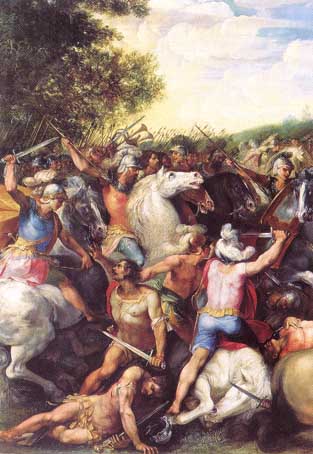Related Research Articles

Aulus Gellius was a Roman author and grammarian, who was probably born and certainly brought up in Rome. He was educated in Athens, after which he returned to Rome. He is famous for his Attic Nights, a commonplace book, or compilation of notes on grammar, philosophy, history, antiquarianism, and other subjects, preserving fragments of the works of many authors who might otherwise be unknown today.
The gens Gavia, or occasionally Gabia, was a Roman family of plebeian descent. It first appears in history during the first century BC, but none of its members obtained any of the curule magistracies until imperial times. The Gavi Arch at Verona was built in honor of one of the Gavii.
Marcus Porcius Cato Licinianus was son of Cato the Elder by his first wife Licinia, and thence called Licinianus, to distinguish him from his half-brother, Marcus Salonianus, the son of Salonia. He was distinguished as a jurist.
Marcus Porcius M. f. M. n. Cato Salonianus was the younger son of Cato the Elder, and grandfather of Marcus Porcius Cato Uticensis, also known as "Cato the Younger".

The gens Sempronia was one of the most ancient and noble houses of ancient Rome. Although the oldest branch of this gens was patrician, with Aulus Sempronius Atratinus obtaining the consulship in 497 BC, the thirteenth year of the Republic, but from the time of the Samnite Wars onward, most if not all of the Sempronii appearing in history were plebeians. Although the Sempronii were illustrious under the Republic, few of them attained any importance or notice in imperial times.
Sempronius Asellio was an early Roman historian and one of the first writers of historiographic work in Latin. He was a military tribune of P. Scipio Aemilianus Africanus at the siege of Numantia in Hispania in 134 BC. Later he joined the circle of writers centred on Scipio Aemilianus. Asellio wrote the history of the events in which he was engaged, and thus preceded Caesar in his more famous accounts of his military campaigns.

The gens Porcia, rarely written Portia, was a plebeian family at Ancient Rome. Its members first appear in history during the third century BC. The first of the gens to achieve the consulship was Marcus Porcius Cato in 195 BC, and from then until imperial times, the Porcii regularly occupied the highest offices of the Roman state.
The gens Carvilia was a plebeian family at ancient Rome, which first distinguished itself during the Samnite Wars. The first member of this gens to achieve the consulship was Spurius Carvilius Maximus, in 293 BC.
Spurius Carvilius Maximus Ruga was Roman consul in 234 and 228 BC. Spurius Carvilius Ruga, the schoolteacher, was his freedman.

The gens Antia was a minor plebeian family at ancient Rome. The Antii emerged at the end of the second century BC, and were of little importance during the Republic, but they continued into the third century, obtaining the consulship in AD 94 and 105.

The gens Antonia was a Roman family of great antiquity, with both patrician and plebeian branches. The first of the gens to achieve prominence was Titus Antonius Merenda, one of the second group of Decemviri called, in 450 BC, to help draft what became the Law of the Twelve Tables. The most prominent member of the gens was Marcus Antonius.
The gens Caelia was a plebeian family at ancient Rome. The nomen Caelius is frequently confounded with Coelius and Caecilius, with some individuals referred to as Caelius in manuscripts, while appearing as Coelius or Coilius on coins. Although the Caelii asserted their great antiquity, none of them attained any of the higher offices of the Roman state until the praetorship of Publius Caelius in 74 BC, and the first of this gens who obtained the consulship was Gaius Caelius Rufus in AD 17. The emperor Balbinus was a descendant of the Caelii.

The gens Hostilia was an ancient family at Rome, which traced its origin to the time of Romulus. The most famous member of the gens was Tullus Hostilius, the third King of Rome; however, all of the Hostilii known from the time of the Republic were plebeians. Several of the Hostilii were distinguished during the Punic Wars. The first of the family to obtain the consulship was Aulus Hostilius Mancinus in 170 BC.
The gens Castricia was a minor plebeian family during the later Republic and under the early Empire. No members of this gens held any important magistracy.

The gens Fundania was a plebeian family at Ancient Rome, which first appears in history in the second half of the third century BC. Although members of this gens occur well into imperial times, and Gaius Fundanius Fundulus obtained the consulship in BC 243, the Fundanii were never amongst the more important families of the Roman state.
The gens Gellia was a plebeian family at ancient Rome, where they settled after the Second Punic War or earlier. The first of the Gellii to obtain the consulship was Lucius Gellius Poplicola, in 72 BC, but the most famous member of this gens is probably the grammarian Aulus Gellius, who flourished during the second century AD.
The gens Mummia was a plebeian family at Rome. Members of this gens are first mentioned after the Second Punic War, and within a generation, Lucius Mummius Achaicus became the first of the family to obtain the consulship. Although they were never numerous, Mummii continued to fill the highest offices of the state through the third century AD.
Marcus Porcius M. f. M. n. Cato was the father of Cato the Younger. His promising political career was cut short by his sudden death, early in the first century BC.
The lex Aternia Tarpeia was a Roman law, introduced by the consuls Aulus Aternius Varus and Spurius Tarpeius Montanus Capitolinus in 454 BC, and passed during their year of office. The law concerned the regulation of payments for fines and penalties.
The gens Salonia was a plebeian family at ancient Rome. Members of this gens are first mentioned as early as the fourth century BC, but few of them attained any of the higher offices of the Roman state, until the latter part of the first century AD, when they married into the imperial family.
References
- Franz Miltner: Porcius 10. In: Realencyclopädie der Classischen Altertumswissenschaft . Vol. XXII, 1, col. 165.